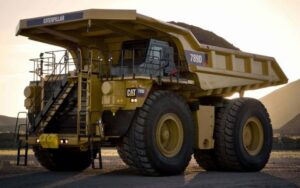Special topics
 About 400 workers at Gold Fields’ Damang Mine in Ghana have been re-engaged by the miner through some of its contractors, CEO Nick Holland has said.
About 400 workers at Gold Fields’ Damang Mine in Ghana have been re-engaged by the miner through some of its contractors, CEO Nick Holland has said.
“We have retrenched some workers but most of those workers have been absorbed by mining contractors, who are providing us with business. So, in fact, the number of those people, who have not been accommodated is actually quite low and I don’t think there have been wholesale loss of jobs here, the loss of jobs has being very minimal because we have been able to transfer those people across to the contractor.
“We can never make assurances because we don’t know what is going to happen to the global prices of the gold price because we don’t have any control over that. But we’re going to work very hard to try and prevent that as that is up and almost in our minds. We’re going to work very hard to come up with the solution that ensures the sustainability of the mine long into the future. That is what we want to do and protect jobs and protect the contributions that we make into the economy,” Nick Holland told Citi FM.
The re-engagement of the retrenched miners follows a recent conclusion of a development agreement between the Johannesburg Stock Exchange- and New York Stock Exchange-listed miner and the Government of Ghana for both the Tarkwa and Damang mines.
The highlights of the agreement include:
• A reduction in the corporate tax rate from 35.0% to 32.5%, effective 17 March 2016.
• A change in the royalty rate from a flat 5% of revenue to a sliding scale royalty based on the gold price (as per table below), with effect from 1 January 2017.
Gold Fields said the terms of the agreement will be for a period of 11 years for Tarkwa and nine years for Damang, each renewable for an additional five years.
The miner said Ghana continues to be a key region for its operations and has commended the Government of Ghana for “creating a fair and competitive environment in the country”.
The agreed royalty rates and corresponding prices are as follows:
Royalty rate Gold price
3.0% US$0 – 1,300/oz
3.5% US$1,300 – 1,449.99/oz
4.0% US$1,450 – 2,299.99/oz
5.0% US$2,300/oz – unlimited
Damang Gold Mine
Mineral Resources: 5.3 million ounces
Mineral Reserves: 1.2 million ounces
• Turnaround at Damang was sustained through 2014
• Re-assessing all options at Damang across the entire mining lease to derive a strategy to drive the best cash-generative plan
• The full mining lease underwent a prospectivity assessment in 2014 to identify and rank brownfield opportunities. A strike of 8km contiguous to the Damang pit provides upside potential with a further 15km of strike trending south-west toward Tarkwa reflecting a prospective corridor for ongoing near-mine exploration. Following this assessment, a three-year phased exploration programme has been profiled that will commence in 2015.
• LoM extended to 2020 (six years).
Tarkwa Gold Mine
Mineral Resources: 9.6 million ounces
Mineral Reserves: 7.5 million ounces
• Solid and consistent anchor for growth in the West Africa region
• Owner-operated, high-volume, grade-driven surface operation
• Low-margin reserves removed from the plan
• Maintaining capital waste strip rates to secure a steady flow of consistent grade ore
• Focus on maintaining high mining fleet and processing efficiencies
• Life-of-Mine extends to 2031 (17 years).
Gold Fields’ West Africa region – Damang and Tarkwa – accounts for 14% of the gold mineral resource and 17% of the gold mineral reserve base, excluding growth projects. Gold Fields also has mines in the Americas, Australasia, South Africa and the Netherlands.
Source: http://classfmonline.com/1.8869640